"It was as if you just closed your eyes and opened them up to a different world."
The words of Garry McGillion perfectly encapsulated the split-second transition from a peaceful sunny Saturday afternoon in Omagh to a scene of utter carnage and human misery.
A brief moment in time that robbed loved ones of 29 lives, plus those of unborn twins, and left more than 200 people injured.
The eyes of the world were upon Omagh in the days after terrorists wrought destruction on 15 August 1998.
Television cameras and photographers captured and portrayed the horror, and then the mourning, with what seemed at the time like a never-ending procession of funerals.
Then the world moved on.
Omagh was consigned to archive folders and library cuttings. It occasionally made headlines through a number of trials and court hearings, but in the vast majority of cases the focus of the news coverage was on the statistics, the numbers killed, not the people.
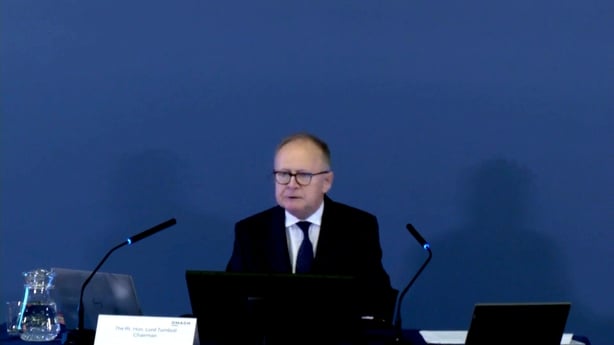
The Omagh Bombing Inquiry has changed that.
Chairman Alan Turnbull has put the voices of the bereaved and injured to the forefront.
He made it clear at the outset that he wants to hear from those who suffered because of the bombing before his inquiry begins its statutory duty to examine if it could have been prevented.
After two weeks of commemorative statements from the families of those killed, last week the focus turned to those who were injured, emotionally as well as physically.
"It's a real healing process as a survivor to have your voice heard in the way in which it was and the dignified way in which it was done today," said Donna-Marie McGillion, Garry’s wife, after the couple had given evidence.
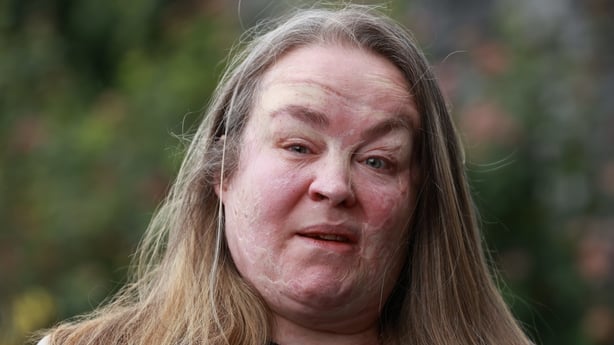
The stories have been difficult to hear, but it has been clear to those watching that those telling them want their voices heard, despite the visceral pain.
Journalists covering the inquiry in the Strule Arts Centre are excluded from the hearing room to give those giving evidence the privacy and space to do so with only family members, friends and counsellors there to provide support, as well as legal teams.
The approach and tone are hugely empathetic. As the hearings are being live-streamed, the camera moves off if the person giving evidence gets upset so as not to intrude. That has happened a lot.
Paul Greaney, the senior lawyer for the inquiry, has been hugely respectful in his direction of the storytelling, gently stepping in to help guide witnesses through their statements when they became upset, and even managing to inject some occasional light into the darkness.
After each statement, Mr Turnbull gives a bespoke response. Not a bland generalised comment, but one that is very personal and reflects the story that has just been told. It’s clear that he has listened and not just heard.
Each story has had its own unique heart rending details, but there are been common themes throughout the accounts.
An eerie silence in the immediate aftermath of the explosion.
Then the sounds. The screams. The sirens. The shop alarms.
The dust. The rubble.
The smell of burning flesh.
Scenes of chaos and panic.
The sights that so many have said no human being should ever see.
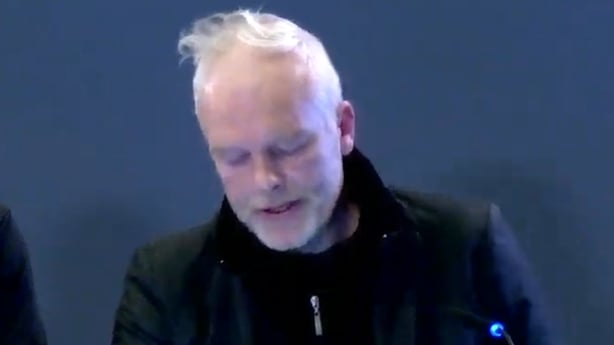
David McSwiggan, who was a 20-year-old student on the day of the bombing, told how he was knocked unconscious after being blown off his feet and awoke to find "lifeless, injured and trapped people everywhere."
Images that can never be erased.
"Body parts, pieces of flesh, broken bodies and water and blood gushing down the street," Edel Doherty told the inquiry in a statement read on Tuesday.
"Casualties with clothes blown off them, the walking wounded wandering around like zombies."
She described the scenes that confronted her as she tried to help the injured as like "a war zone".
Journalists are used to covering court hearings with some horrific details, but last week was unrelenting in its intensity and levels of horror and pain.
At times there were audible gasps, some sobs and looks of disbelief in the media room at what we were hearing.
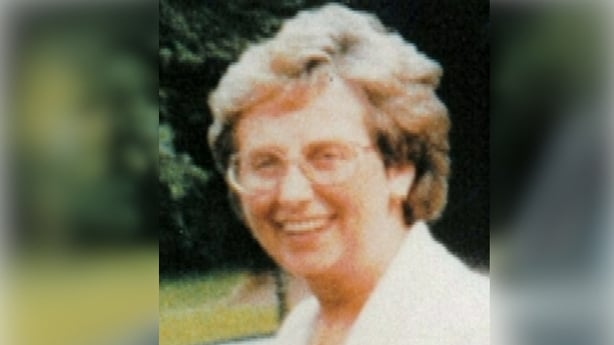
The week began with the story of Veda Short, a 56-year-old mother of four killed just hours after meeting her newly-born grandson for the one and only time.
Her children watched by video link as a solicitor read their statement describing how their world was shattered after she "was taken from us in such a brutal manner."
The sense of loss was palpable.
"We never got the chance to say goodbye or see her grow old or take care of her as she had done for us.
"Our dad was a broken man from that day on. His whole world had just collapsed, and he had nothing left to live for. We lost both our parents that awful day."
Kevin Skelton, who has spearheaded efforts to have those responsible brought to justice, told how he found his wife Philomena, known as Mena to her family, lying face down in the rubble two weeks before they were due to celebrate their 20th wedding anniversary.
Her injuries were so severe the funeral directors advised him not to let anyone see her, so she had a closed coffin.
"I never got the chance to say goodbye," he said, the pain etched on his face.
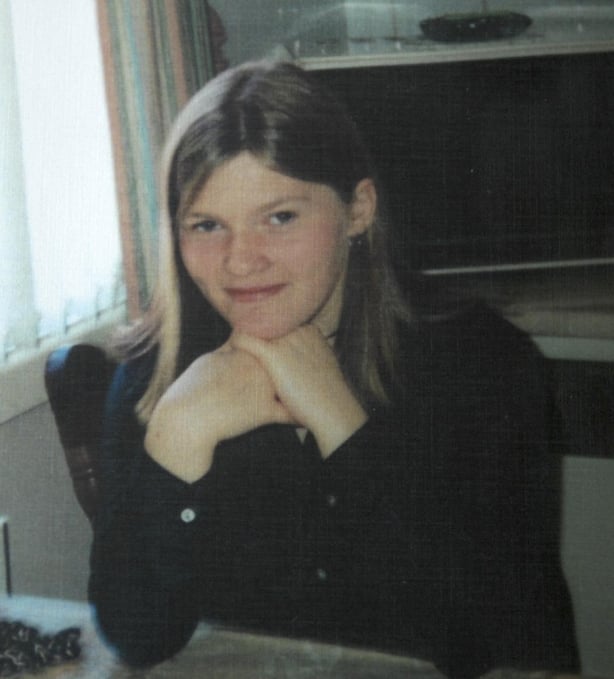
Lorraine Wilson was a 15-year-old schoolgirl who had been working in the town’s Oxfam shop alongside her friend and colleague, Samantha McFarland. They were both killed.
Solicitor Beth McMullan read a family statement that stopped everyone in their tracks when it described how the family was taken to a makeshift morgue to identify her body.
"There was a little pool of blood in Lorraine’s eye, and I remember dad asking for a tissue to collect the little pool of blood and he said 'this is all I have of you now.'"
Chairman Alan Turnbull described their experience as "an emotional assault such as no-one could be expected to endure."
Justin Hughes spoke of the "insurmountable loss" of his beloved twin sister Julia, who had been studying for a degree in accountancy at Dundee University in Scotland and was home working in a shop during the summer holidays when she was killed, a year before she was due to graduate.
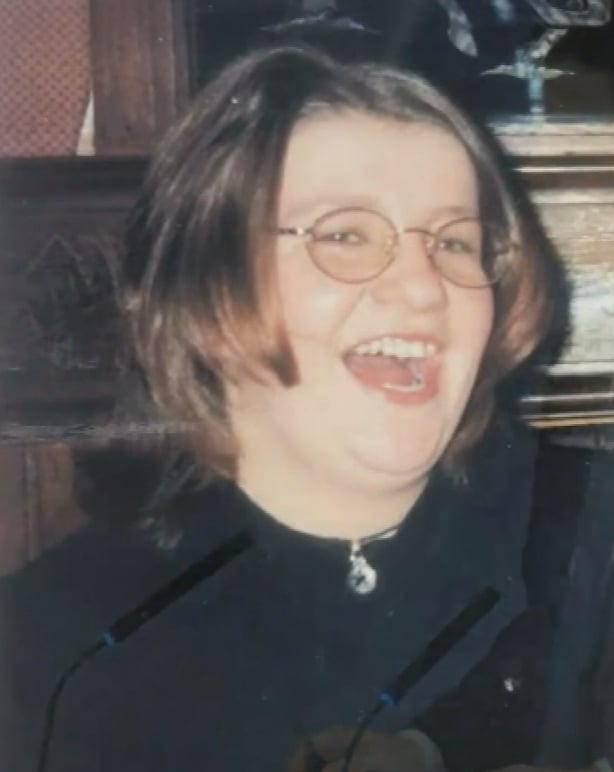
"She was my twin and now I am her voice," his statement said.
"We never got to share with her so many precious milestones in life, like her graduating, getting married and having children. The what ifs will always be there. After 26 years it gets no easier."
On Tuesday, the survivors and witnesses began to tell their stories.
Voices and names that have largely not been heard in the 26 years since the atrocity.
Ian Ferguson, who had been working in his family’s dry cleaning business, outlined how he spent the day helping the dying and the injured.
"It was just carnage, the squealing and crying, the smell of smoke. It was just terrible," he told the inquiry.
"I met the late Fr Mullan on the street, went back to the shop and got sheets for him. As he was giving people the last rites I was putting sheets over them."
He began suffering depression shortly after the explosion and said he has "been fighting it ever since."
Valerie Hamilton spent 10 days in hospital being treated for shrapnel injuries all over her body, including serious wounds to her face and one eye.
In a statement, she spoke of the horrific scenes on the day and the long-lasting impact of the injuries and trauma she suffered.
Her eyesight and hearing were damaged, and she continues to suffer from severe anxiety.
"I am wary when in crowds. I will work out in my head where my nearest exits are as I need to know that I have an escape route.
"I have a constant fear of dying."
She takes medication for anxiety because "what I saw that day can never be unseen."
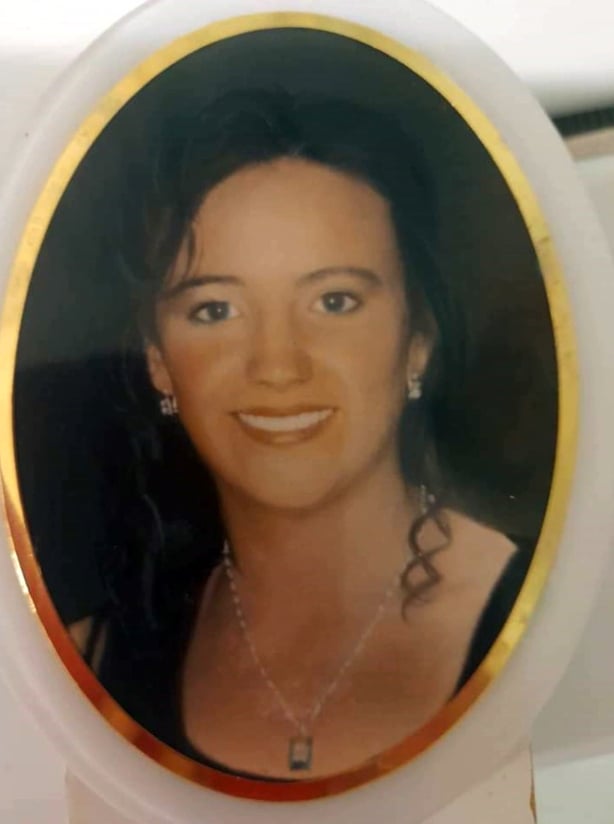
The sister of 17-year-old Jolene Marlow spoke of the pain of not being able to attend her funeral because she herself had been seriously injured.
Nicola Marlow also said she has carried a burden of guilt because she had arranged to meet her sister in the town for lunch. They walked past the car containing the huge bomb a short time before it exploded.
She herself suffered life-changing injuries that she said had required many "gruelling surgeries" and have defined the rest of her life.
"The last time I saw my sister was standing side by side behind the car that would ultimately kill her and maim me," she said in the statement read by solicitor Emma Fox.
On Tuesday afternoon, Pauline Harte, who was 19 on the day of the bombing, recounted an experience that moved and horrified everyone who heard it.
She told how the burning engine of the car that contained the bomb landed on her.
"It was on fire. I was on fire underneath it," she said with her husband Ronan by her side.
"I didn’t know it was a fire, because fire has the colour yellow in it. I saw deep black, orange and red colours moving and it sounded as angry as it looked. My ears hurt and everything was muffled, people were screaming above the noise of the engine.
"I knew I was trapped and reached my hand down to see what was stopping me. I touched the bar across my stomach, and that is my first memory of the pain.
"The tar was melting around me and my elbow was sunk into it."
She recalled how a group of men put out the flames and worked to get the engine off her. One of those who helped was Ian Ferguson.
One of the men later told her he went home "with pieces of her skin melted to his hands."
An experience that defies imagination.
And yet despite her own horrific injuries and trauma, the last words of her statement reflected on those who lost their lives.
"My body is broken but I will be forever thankful that I don’t have a broken heart."
Rosemary Ingram, who was on duty as a traffic warden just yards from the scene of the car bomb, was blown through the air by the force of the blast and suffered multiple shrapnel injuries.
"Twenty-six years after the explosion I still have shrapnel coming out of my body, sometimes with ongoing bleeding," she said.
On Wednesday, we heard the remarkable stories of Garry and Donna-Marie McGillion.
They described that sunny Saturday afternoon as a happy time as they had just bought their first home and were looking forward to "a new chapter" as they were to marry the following Saturday.
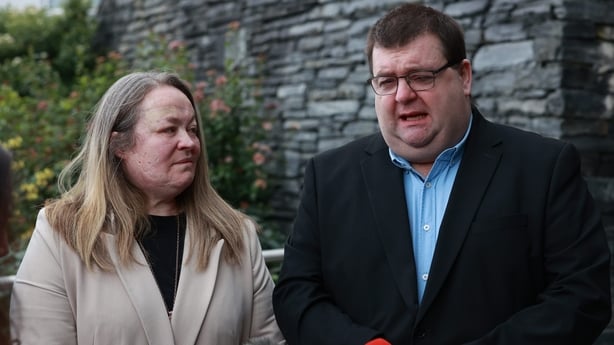
They had gone into town shopping to buy new shoes for Garry’s niece and goddaughter Breda Devine, who was to be a flower girl.
Then everything changed in an instant, with Garry likening it to closing his eyes "and opening them up to a different world."
After the blast his shirt and body were on fire, and he had a hole in the back of his head but immediately began to frantically search for Donna-Marie and Breda and found them lying under a large sign that had been blown off a shopfront.
After managing to pull them from the rubble he ran along the street with his young niece in his arms to get medical attention for her.
He told the inquiry he could feel her "feint little heartbeat" against his chest as he ran, but Breda died a short time later.
"Why was I spared? I had lived 24 years of my life; she had lived 20 months," he said.
Donna-Marie was one of the most seriously injured to survive the blast.
With third-degree burns to 65% of her body, she was given just a 20% chance of survival. She spent six weeks in hospital in an induced coma and was given the last rites four times.
Incredibly, seven months after the attack two priests who gave her the last rights concelebrated her marriage to Garry.
In her statement, Donna-Marie urged the inquiry chairman to provide the answers that the bereaved and survivors are seeking.
"If you think the stone needs unturned unturn it please," she said.
Mr Turnbull described her will to live as "beyond remarkable."
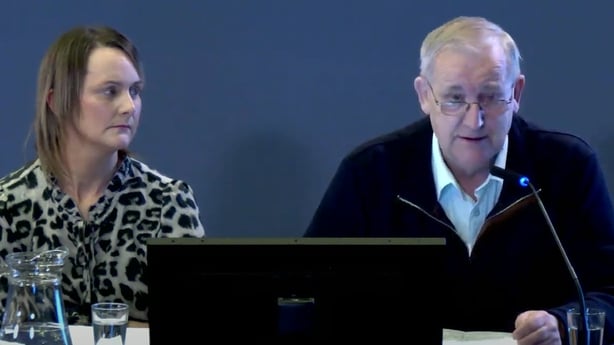
Jim Sharkey, who owned a newsagents in the town, told the inquiry that "the world stood still for 30 or 40 seconds" after the blast.
He spoke to four of those killed, Geraldine Breslin, Ann McCombe, Sean McGrath and Libby Rush, shortly before the explosion.
He said that he "went into a dark place", had to give up his business and was referred for psychological counselling shortly after the atrocity.
He now avoids going into the town centre on Saturdays, the day of the bombing.
Suzanne Travis, a 20-year-old student, was so traumatised by what happened to her that she frantically searched for her mother without realising that her own left foot had been blown off.
She still vividly remembers the dreadful moment doctors told her that they would have to amputate her lower left leg, and she had to sign her own consent form because her parents were not present.
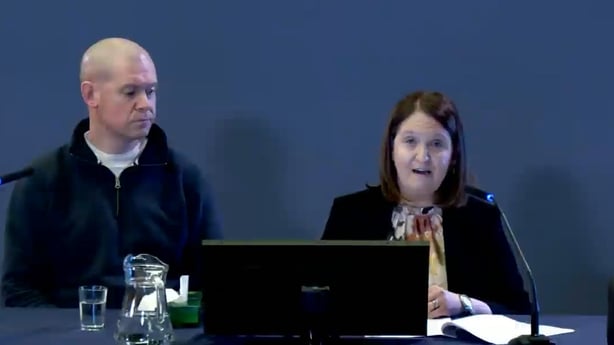
Jaimie McGlinn recalled how he and his girlfriend were "blown out of their shoes" by the force of the blast.
"I remember the sirens going off. I remember the glass. I remember the smell, "he said.
"Burning matches is probably the best way to describe it."
There was shock when an organiser of a carnival parade due to pass through Omagh on the day of the attack told the inquiry the death toll could have been even worse if they event had not started late.
Lisa McGonigle had helped organise for a group of children to be on a float in the parade, but traffic in the town was at a standstill while the area was being evacuated following a bomb alert and organisers and those taking part could not get to the meeting point on time.
In a statement read by a lawyer, she said she believed that had saved lives because otherwise "the children would have been right in the middle of this."
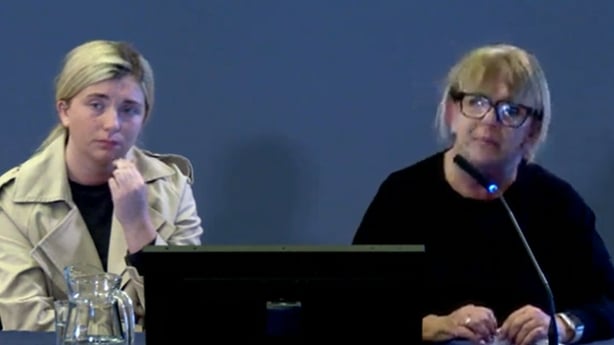
Caroline McKinney spoke while sitting alongside her daughter Niamh, who had a piece of shrapnel embedded in her brain after her buggy was blown across the road by the force of the blast.
Ms McKinney owned a beauty salon in the Co Tyrone town and had taken the 13-month-old girl to work on the day.
She recalled the pain and anxiety of being separated from her daughter for a week when they were both being treated separately for injuries sustained in the blast.
Doctors said it was safer to leave the shrapnel in Niamh’s head, but as a consequence she developed epilepsy a few years later.
Margaret Murphy, an off-duty nurse with accident and emergency experience, told how she rushed to Tyrone County Hospital to help treat the injured and was shocked by what she saw, describing how she and another nurse hugged and cried because of the magnitude of it.
In the midst of bloodshed and chaos she recalled a moment of kindness when a woman came into the part of the hospital where she was treating people and asked if they "would like a wee cup of tea."
"As we had been very busy all day all I could do along with the other staff nurse was to laugh," she said.
"The last thing on our mind was a wee cup of tea but bless her, I remember her empathy very well."
It was a rare glint of light in a week of darkness and horror.
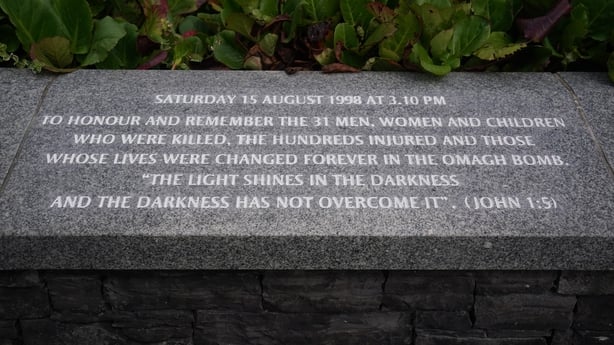
Those responsible for planting the bomb that wrecked so many lives and dreams will probably not have watched and listened. Part of their training is not to do anything that would humanise their victims.
As Mr Turnbull has remarked several times, the humanity on display in these hearings stands in sharp contrast to the inhumanity and depravity of those who would abandon a huge bomb in the middle of a busy town and just walk away.
The world moved on quickly after the bombing on 15 August 1998.
These hearings have illustrated that those bereaved and injured and those unfortunates there that day have not been able to move on.
They hope this inquiry will provide answers they have been seeking for almost 27 years.
Then, as Donna-Marie McGillion said, they can begin to heal.







